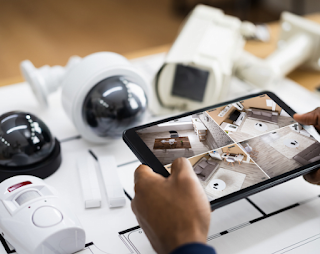The Ultimate Guide to Alarm Installation: Protecting Your Home and Business
Alarm devices are designed to protect you, your family, and your business. To maximize their effectiveness, proper placement is crucial.
Whether you opt for a monitored or unmonitored system, start by identifying the features that best suit your needs. Next, consider how access to your property will be managed. Additionally, decide on the communication method between the system and its sensors.
Burglar Alarms
Burglar alarms are a great way to deter burglaries and other types of crime from targeting your home or business. They also help to alert the authorities in case of a break-in. They can be a very effective deterrent when combined with other security measures such as CCTV, timed internal lights and door and window sensors. They can even be linked to a monitoring centre that will call the police for you in the event of a break-in.
A basic burglar alarm system relies on sensors strategically placed on doors, windows, and key areas to detect movement. These sensors communicate with a central control panel, which acts as the system's brain. When a sensor is triggered, the control panel verifies the threat before activating the alarm. This can be a loud siren to deter intruders or a signal to a monitoring center for immediate response.
Unlike simple door or window sensors, burglar alarms require physical tampering, such as cutting wires, to be disabled. This added layer of protection enhances security by making it more difficult for intruders to bypass the system.
There are a variety of ways that an alarm can be triggered, including motion sensors that use infrared light to detect movement, photobeam sensors and magnetic contacts on doors and windows. Some alarms use a loud siren to deter intruders, others use a silent alert to the authorities or to a customer call centre, and some are designed for people with hearing impairments and produce a flashing light instead.
While DIY alarm installation may seem like a good idea at first, several hidden challenges can often outweigh the financial benefits. A professional security company can assess your home or business’s security needs, recommend a solution and install an alarm that provides reliable protection. Professional companies also offer a high level of customer support that can be very useful when troubleshooting issues at 3am.
Fire Alarms
Fire alarms, which detect smoke and heat, are essential for fire safety in both residential and commercial buildings. They are particularly crucial in high-rise structures where smoke can spread rapidly, posing significant risks to lives and property. A fire detection system typically includes smoke detectors and heat sensors distributed throughout the building, all connected to a central control panel that alerts occupants in the event of a fire. Advanced fire alarm systems can also integrate with a building’s ventilation, smoke management, and stairwell pressurization systems to enhance overall safety.
The type of fire detectors required depends on various factors, including the building’s size and purpose, local fire codes and regulations, and specific hazards in different areas. For instance, high-rise apartment buildings and industrial manufacturing plants require more advanced and specialized fire safety equipment compared to small business offices or luxury homes. Consulting a professional can help you identify the specific needs and select the appropriate fire alarm devices for your property.
If you are installing your own smoke detectors, follow the device manufacturer’s instructions and local building code recommendations for location. It is also a good idea to use a stud finder to locate ceiling joists or wall studs and mark drill points. Then, drill the holes and use a hammer to tap plastic screw anchors into the hole. After the anchors are in, place the smoke detector in its mounting bracket and twist into position. Finally, screw on the base plate and insert batteries.
Integrating your fire alarms into a smart home security system can provide a more sophisticated level of protection. This ensures that all detectors are triggered simultaneously, even if one has a low battery or is temporarily deactivated. Additionally, it allows you to monitor and control your fire alarm system remotely through a smartphone app.
Consistent maintenance is crucial, regardless of whether you have a DIY or professionally installed system. Routine inspections and any necessary repairs will keep the system functioning optimally and minimize the risk of false alarms. Erroneous alerts can lead to panic and confusion during an actual emergency. Having a technician regularly assess your fire alarms will provide the best possible safeguards for your home and family.
Carbon Monoxide Alarms
Carbon monoxide alarms are special safety devices designed to detect and warn you of dangerous CO levels. They are essential in any home, especially in areas where oil-burning appliances such as fireplaces, stoves, fireplaces, water heaters and more are used. CO poisoning is the leading cause of death from accidental poisoning in the United States (Centers for Disease Control). Detectors detect CO leaks by using sensors to measure the concentration of carbon monoxide and sound an audible alarm when a dangerous CO level reaches its sensor.
A carbon monoxide detector consists of a detection chamber, an electronic device and a battery or power source. Most CO monitors also have a test/reset button that allows you to test the device for proper operation. Some models also include a display panel that shows the amount of CO in the air.
Most importantly, you should install your CO detector at least 5 feet above the floor. This is because CO gas is lighter than air and rises. It is also important to keep the detector out of direct sunlight, as UV rays can affect the performance of the CO sensor.
If the CO alarm sounds, it's essential to vacate your home. If possible, open windows and doors to provide fresh air while you wait for emergency responders to arrive. If you're experiencing symptoms of CO poisoning, such as headaches, dizziness, nausea and fatigue, call 911 and see a medical professional immediately.
Carbon monoxide detectors should be installed on every level of your home, including outside sleeping quarters. It's also crucial to have a professional evaluate your home's fuel-burning appliances once a year to ensure they're running properly and there are no carbon monoxide leaks.
It's also critical to understand how to properly dispose of a Carbon Monoxide Alarm when it fails or is nearing the end of its life. Different units require different disposal techniques, so reference your User Guide for precise instructions. You should also learn how to reset and replace the batteries in your carbon monoxide detector, which are not permanent and will need to be replaced frequently.
DIY or Professional Installation
If you’re looking for a comprehensive home security system, it’s a good idea to seek professional installation services. Professional installers can ensure your equipment is set up correctly and integrates seamlessly into the home environment. They can also provide maintenance and technical assistance, which can prove invaluable over the system’s lifespan.
However, some homeowners may prefer the DIY approach. This option has the potential to save on installation costs and allows you to set up the system at your own pace. It also gives you the flexibility to choose equipment that fits your specific needs and preferences and fits your budget.
DIY systems are usually easy to install, featuring a user-friendly interface and step-by-step instructions. This is especially true for wireless systems, which require no complicated electrical work. However, the complexity of home security setup increases with more sophisticated equipment. In addition to sensors and cameras, many systems require specialized wired components, such as doorbells and door locks that communicate with a central alarm system. This poses a significant challenge for the inexperienced.
In addition to ensuring a proper setup, professional alarm installers can help you optimize your system for the best performance. This includes identifying potential vulnerabilities and providing advice to mitigate them. They can also recommend specific configurations designed to meet the unique security requirements of your home.
Lastly, professional installation offers peace of mind in the form of warranty and customer support. Many professionals offer an assurance of quality craftsmanship, and you can rely on them to troubleshoot and resolve any issues that arise.
Whether you’re considering a DIY or professional installation, it’s important to purchase your system from a reputable home security company with decades of industry expertise. When you select Garrison Alarms Auckland as your provider, you may enjoy a six-month money-back guarantee, and 24/7 professional monitoring by one of the most trusted names in the business. Contact us today to learn more about the benefits of choosing ADT for your home or small business security solution. We can answer any questions you might have about the best system for your needs, and we’ll connect you with an expert who can help you get started.
CCTV For Hospitality Business Security
CCTV systems provide a cost-effective means of deterring crimes like theft, vandalism, and burglary, making them an essential component of modern security measures. The high-quality footage captured by these systems not only helps prevent criminal activities but also aids in the identification and prosecution of offenders.
Wireless CCTV cameras, in particular, offer a convenient and discreet solution. Easy to install and powered by batteries, they are perfect for locations where traditional wiring is impractical. These cameras can be accessed and monitored remotely via a mobile device, providing flexibility and peace of mind for users.
Retail
As a business owner, you need to ensure your property and staff are safe at all times. CCTV is a security force multiplier, offering an effective way to monitor your premises and protect your assets. A CCTV system offers multiple benefits, including scalability to suit your needs and integration with other business security solutions.
Regardless of the size or type of your retail business, you can use CCTV to improve security, prevent crime, and improve customer service. It can also help you track sales and monitor customer behaviour.
CCTV systems offer robust security solutions for both residential and commercial properties. Equipped with high-definition capabilities and advanced low-light technology, these systems capture clear footage, aiding in the identification of perpetrators in case of a breach.
Beyond crime deterrence, CCTV plays a vital role in monitoring business operations. It helps prevent theft, both by customers and employees, providing valuable evidence and insights into potential security vulnerabilities.
Many retailers are finding that CCTV can be an effective tool to reduce the number of incidents of shoplifting and other types of theft within their stores. In fact, according to the U.S. Chamber of Commerce, nearly half of small retail businesses are forced to raise prices due to the financial impact of shoplifting.
Business owners can access live or recorded footage from anywhere with an internet connection, using mobile phones, tablets, and computers. Cameras can be set to trigger alerts or record only when motion is detected, saving on storage and energy costs. They can also be integrated with other business security systems, such as barriers and alarms.
A variety of cameras are available to meet your business’s specific security needs, including IP cameras. Many of these can be connected to onsite storage devices (a DVR for analog CCTV systems and an NVR for IP systems), allowing you to view the data remotely. Alternatively, you can opt for cloud-based storage.
You can also opt for auto-tracking cameras, which automatically follow and record moving objects. They’re ideal for retail locations, where they can help you identify trends in customer behaviour. They’re also helpful for monitoring parking areas, where they can help deter thieves by reminding them that their actions are being recorded.
Hospitality
The hospitality industry encompasses a wide range of services catering to customers, guests, business partners, and travelers. This includes food, entertainment, accommodation, and other amenities. For hospitality businesses, a CCTV video surveillance system is a valuable tool for ensuring the safety and security of everyone on the premises.
CCTV serves as a powerful deterrent against criminal activity, such as theft, vandalism, or fires. It provides a visual record of everything that happens on the property, which can be crucial for investigating and prosecuting any incidents. This makes CCTV an essential resource for maintaining a secure environment and protecting both the business and its occupants.
Beyond deterrence, CCTV can also help hotel managers and staff identify patterns of behavior that may require attention. Whether it's monitoring for unauthorized guests or suspicious activities at the reception desk, the surveillance footage can enable proactive measures to address security concerns before they escalate. CCTV is particularly useful during times of uncertainty, such as the COVID-19 pandemic, when people counting and occupancy monitoring can help ensure that spaces do not become overcrowded.
By implementing a comprehensive CCTV system, hospitality businesses can enhance the overall safety and security of their operations, providing a more secure and welcoming environment for all who visit.
In addition, the right CCTV solution can be used to prevent theft and fraud and to assist with insurance claims. Using cameras to capture footage of a break-in or other incident can help businesses settle bogus insurance claims and reduce the burden on their bottom line.
With the right setup, it’s easy to access and view business security footage remotely. Using an IP system with NVR CCTV, you can watch live feeds on your smartphone, tablet or computer. This is especially beneficial for hospitality businesses that need to be able to respond quickly to incidents occurring on the property.
Choosing the right CCTV setup for your business needs requires careful consideration. The best option is to speak to an experienced security integrator who can advise on the best fit for your organisation. They can take into account your security objectives, budget constraints and legal requirements to recommend the most appropriate technology. A bespoke system will be more cost-effective than a one-size-fits-all approach and will be more likely to deliver the results you need.
Industrial
CCTV is one of the most effective business security tools, but it's important to take a strategic approach when choosing a system and make sure your choice fits the unique needs of your business. Whether you have a cozy cafe, a busy shop or a large warehouse, the right CCTV system can protect your assets and keep your staff safe.
In addition to providing effective deterrence, CCTV is a very effective way to record activity on your property for use in criminal prosecution. As technology advances, CCTV systems have become more powerful and affordable, making them ideal for businesses of all sizes.
As a result, there is now a wide variety of CCTV camera systems available to meet the specific security needs of industrial businesses. These systems come in both hardwired analog and IP (network) configurations. Analog CCTV systems are more traditional and require coaxial cable to connect cameras and surveillance monitors. IP security cameras are more flexible, allowing you to connect your CCTV system to the Internet via an existing Wi-Fi network and view footage from anywhere with an Internet connection.
Another advantage of CCTV is that it gives a real-time record of actions on your business premises at all times of the day and night. This is especially important for industrial enterprises that operate around the clock. CCTV video monitoring is more efficient and cost-effective than paying security officers to monitor the facilities.
A well-chosen CCTV system can also increase workplace safety and staff productivity. CCTV can rapidly and precisely identify persons or objects by recording suspicious activity, which is critical for decreasing theft and vandalism. Additionally, CCTV can give evidence in the event of a dispute between employees or management, allowing situations to be resolved more quickly. In fact, studies show that businesses with CCTV systems experience fewer workplace injuries and security incidents.
Office
A CCTV system is a key component in an office business security solution. It helps to deter criminal acts by letting people know they are being recorded and can also assist law enforcement in catching them in the act. It can be installed in strategic areas such as door controllers, entrances and exits, rooms that contain valuable equipment or assets, and other high-traffic areas to protect your office spaces from vandalism and break-ins.
The best commercial CCTV systems in Auckland can capture high-resolution images and some offer night vision. They can also provide a live feed, and many are integrated with access control systems to notify users when an event occurs. This can help to reduce costs by minimizing false alarms. It can also increase the efficiency of a facility by eliminating manual tasks such as securing doors.
Another reason CCTV systems are important for office spaces is that they can be used to monitor employee behavior and performance. This can help increase productivity, reduce turnover, and prevent fraud and theft. CCTV can also help resolve workplace disputes. It can resolve disputes fairly based on evidence, not emotion or bias.
Implementing a comprehensive security system can also help companies meet industry standards and maintain regulatory compliance. This includes physical safeguards such as surveillance cameras and security plans, data protection measures such as secure password policies, and cybersecurity strategies against threats such as phishing. In addition, effective visitor management procedures, such as digital registration and technology integration, help prevent unauthorized intrusion and maintain stakeholder confidence.
Whether you are looking for an office CCTV or any other business security system, it is important to choose one that suits your needs and budget. The best way to do this is by setting requisite criteria that can be used to gauge the performance of different security solutions. For example, you may need to consider the number of cameras required and whether you want them to be monitored locally or remotely. In addition, you should ensure that the security solution is compatible with your current infrastructure and can be scaled as your needs change. Finally, you should test your security systems regularly to ensure they are working properly.




Comments
Post a Comment